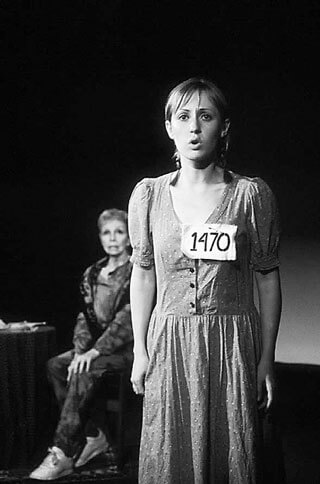Playwright stages a Holocaust play based on family’s stories
Ester Holtzberg was a 14-year-old when the Nazis came to Krakow, and a battered, hollowed, starving but indomitable young woman of 85 pounds when the U.S. Army liberated Mauthausen concentration camp in Austria.
It was her 20th birthday, May 7, 1945.
“Ever since, she has loved Americans,” said her niece, Miri Ben-Shalom, a documentary film editor and playwright. “They gave her the ultimate birthday present.”
Between Krakow 1939 and Mauthausen 1945, the young Ester Holtzberg had endured just about every brutality known to humanity––mass killings, ferocious beatings, degradation, forced nudity, SS dogs, slave labor, forced viewing of hangings, a 30-mile death march in below-freezing temperature from Krakow to Auschwitz, a transport in roofless boxcars from Auschwitz to Bergen-Belsen, where the Germans didn’t need gas chambers to kill Jews, among them, Anne Frank. Typhus and typhoid did it. And from Bergen-Belsen, a 16-day transport by cattle car, under bombardment, without food or water––except sparse rainwater––to Mauthausen.
Ben-Shalom has crafted what she calls “a theatrical documentary” out of her aunt’s experiences––it gets two performances on Sunday, October 3 and one on Tuesday, October 5, at the Center for Jewish History––but it wasn’t her aunt who’d unloosed this project to begin with, it was Ben-Shalom’s mother. Or, rather, it was what her mother, Shoshana Sinai Ben-Shalom, left out––which, over many years, was everything.
“My mother, who was from Lodz, Poland, was also a Holocaust survivor,” the Israeli-born Greenwich Villager said over a cup of pea soup one recent afternoon. “But she never spoke about any of it. We could feel it every day, every hour, every month, in many other ways than spoken words. She didn’t want to tell, and I didn’t want to hear.
“I’d read a lot, and knew about the Holocaust, but I couldn’t imagine my mother in it. Then, ten years ago, she got sick, with pancreatic cancer. I knew it was fatal, she did not, but one day she handed me 16 pages that my Aunt Ester had written and given her years earlier. ‘Here,’ my mother said, ‘I think you should read this, and when I get better I’ll tell you what I went through.’ But my mother died, in 1991––my God––13, 14 years ago, not ten––time flies!––and I never heard her story.”
Ester Holtzberg, now Mrs. David Herschberg, is still alive and well, going on 80 and still running a hardware store just outside Tel Aviv with her plumber husband. Five years after Ben-Shalom’s mother died, her father, Ester’s brother Henek, who had survived both the Germans and the Russians, also died of pancreatic cancer.
“That,” said their daughter, “is when I realized I knew nothing of their stories, and that’s when I read those 16 pages and went back to Israel and started to interview my aunt. At first I thought of making a documentary film about it, but then I saw that she could never do the traveling, to Auschwitz, Bergen-Belsen and so forth. So I undertook the long process of interviewing her, five years.”
Out of those five years comes this play, “I Can Cry,” a drama for three actors, two women and one man, intermingled with documentary footage. One actor plays the Ester of today, looking back, remembering. The other plays Ester age 14 through 20, here called Erna by way of dramatic differentiation. But they are one and the same.
“I took what I had on tape from my aunt, 15 hours at least, and decided to make it into a one-woman play. But as I was writing it,” Ben-Shalom said with a suppressed giggle, “it became a two-woman play. Ester’s younger self jumped out and said: ‘I’m here too!’”
The third actor plays a variety of German officers and soldiers.
The players are Barbara Bleier (Ester), Kathy Searle (Erna) and Lance Spellerberg. The piece is co-directed Ben-Shalom and Harvey Stein. After well-received readings at two New York City high schools and six full performances at the Greenwich Street Theater in the 2003 New York Fringe Festival, it went on to acclaim this year at the Lion & Unicorn Theatre upstairs over a London pub. and then a “very rewarding” August run at the Edinburgh Fringe.
“And now,” the author, ecstatic, said, “we’ve been invited to do a full week in Romania.”
Ben-Shalom’s other current endeavor is From Home to Homeland, Inc., an anti-bigotry, anti-hatred project she founded and runs.
“This story,” the playwright said, “is the story of the Final Solution.” Ester Holtzberg Herschberg long ago declined to be solved.

































